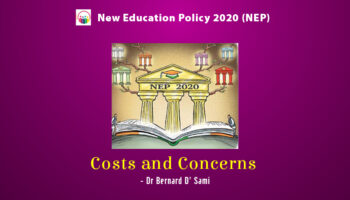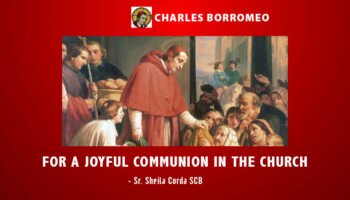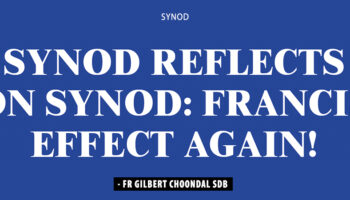“Ensure that in every Christian community the poor feel at home.” (EG 199)
Pope Francis’s 2013 Apostolic Exhortation Evangelii Gaudium (“The Joy of the Gospel”) has been described as a remarkable and radical document that could be considered his manifesto and a “Magna Carta” for the Church today. It is a vision statement about the kind of Church Pope Francis wants. The main thrust of this 224-page Apostolic Exhortation is, of course, on sharing the joy of the Gospel with the world — in other words, evangelization. An important part of evangelization is the fight against everything that is dehumanizing in society. It is in this context that Pope Francis highlights the problem of poverty and the obligations Christians have to the poor and the urgent need to establish and maintain just and fair economic and financial systems that respect human dignity and serve human need. Here is a summary of the parts dealing with this theme in the document. (The numbers within brackets refer to the paragraph numbers in the original document.)
NO TO AN ECONOMY OF EXCLUSION
In today’s world, “pervaded as it is by consumerism and the feverish pursuit of frivolous pleasures and a blunted conscience,” Pope Francis says, “there is no longer room for others, no place for the poor” (2). Among the many challenges of the present times, the pope singles out the “economy of exclusion and inequality” in which it is news when the stock market drops a couple of points but not when a homeless man dies on the street (53). “Such an economy kills,” says Pope Francis. He condemns the system based on “competition and survival of the fittest”, in which “the powerful feed on the powerless” and “masses of people find themselves excluded and marginalized” (53), leading to a ‘throwaway culture’ in which the excluded are not only exploited but considered leftovers.Pope Francis lashes out at the “trickledown” theories which naively believe that when the rich become richer, some economic benefits will automatically trickle down to those at the bottom of the economic ladder. He laments that as a result of the “globalization of indifference,” we have become incapable of feeling compassion at the cry of the poor. Instead, “we are thrilled if the market offers us something new to purchase; and in the meantime all those lives stunted for lack of opportunity seem a mere spectacle – they fail to move us” (54). Calling for the inclusion of the poor in the economic system, Pope Francis states that “Each individual Christian and every community is called to be an instrument of God for the liberation and promotion of the poor, and for enabling them to be fully a part of society” (187). This means “working to eliminate the structural causes of poverty and to promote the integral development of the poor and doing ‘small daily acts of solidarity in meeting their real needs’” (188).
NO TO THE WORSHIP OF MONEY
Pope Francis questions our dubious relationship to money. We quietly accept its dominion over ourselves. He notes that the current financial crisis has its origin in a profound human crisis, namely, “the denial of the primacy of the human person!” (55). “The worship of the ancient golden calf has returned,” he says, “in a new and ruthless guise in the idolatry of money and the dictatorship of an impersonal economy lacking a truly human purpose” (55). He is alarmed at the growing gap between the rich and poor, which he sees as the result of “ideologies which defend the absolute autonomy of the marketplace and financial speculation”, creating “a new tyranny … which unilaterally and relentlessly imposes its own laws and rules” (56). Behind this new idolatry, Pope Francis sees “a rejection of ethics and a rejection of God” (57), and he calls for “a vigorous change of approach on the part of political leaders” and the restoration of “an ethical approach in economics and finance which favours human beings” (58). “Money must serve, not rule”, says Pope Francis, and “the rich must help, respect and promote the poor” (58).
NO TO INEQUALITY WHICH SPAWNS VIOLENCE
The Pope says inequality breeds violence. The world is frantically searching for a solution to such violence. Pope Francis reminds them that “until exclusion and inequality in society is reversed, it will be impossible to eliminate violence” (59). When equal opportunities are lacking in society, different forms of aggression and conflict are likely to find fertile breeding grounds among the aggrieved. When a society is willing to leave a part of itself on the fringes, no amount of resources spent on law enforcement or surveillance systems can guarantee tranquility (59). The socio-economic system is unjust at its root. The evil embedded in the structures of a society has a constant potential for destruction. Evil crystallized in unjust social structures cannot be the basis of hope for a better future (59). “The need to resolve the structural causes of poverty cannot be delayed” (202), says Pope Francis. “As long as problems of the poor are not radically resolved by rejecting the absolute autonomy of markets and financial speculations and by attacking the structural causes of inequality, no solution will be found for the world’s problems or, for that matter, for any problem. Inequality is the root of social ills (202).
OPTION FOR THE POOR
“God’s heart has a special place for the poor, so much so, he himself became poor” (197), says Pope Francis. The option for the poor is a constant and clear imperative in Scripture and in the writings of the Fathers of the Church which created “a prophetic, countercultural resistance to the self-centred hedonism of paganism” (193). “We may not always be able to reflect adequately the beauty of the Gospel,” says the pope, “but there is one sign which we should never lack: the option for those who are least, those whom society discards” (195). In short, God has a heart for the poor and so must we. The option for the poor is “primarily a theological category which reflects the way God came into the world” (198). For God, the Incarnation was an act of preferential option for the poor, and so Pope Francis says, “I want a Church which is poor and for the poor” (198). The poor have much to teach us, says Pope Francis. “We need to let ourselves be evangelized by them … We are called to find Christ in them, to lend our voice to their causes, but also to be their friends, to listen to them, to speak for them and to embrace the mysterious wisdom which God wishes to share with us through them” (198). Further, we have a duty to defend the rights and dignity of those who are poor, and also to love them, listen to them, treat them as members of our family, as sisters and brothers. “The worst discrimination which the poor suffer,” says the Pope, “is the lack of spiritual care” (200).
CONCLUSION
Growth in justice demands more than economic growth. It requires decisions, mechanisms and processes specifically geared to a better distribution of income, the creation of employment opportunities and an integral promotion of the poor which goes beyond a simple welfare mentality (204). Moreover, if we really want to achieve a healthy world economy, what is needed is to “ensure the economic well-being of all countries, not just of a few” (206).
The ‘Joy of the Gospel’ captures the joy of meeting God in the daily struggles of the poor. Pope Francis is reminding us that the more we love the poor, the more fully human we become; the more generous we are with the needy, the more blessed we shall be; and the more we serve those who suffer, the more we begin to experience the joy of heaven
– Fr. K. J. Louis SDB is a well-known writer, editorial and preacher
To subscribe to the magazine Contact Us





